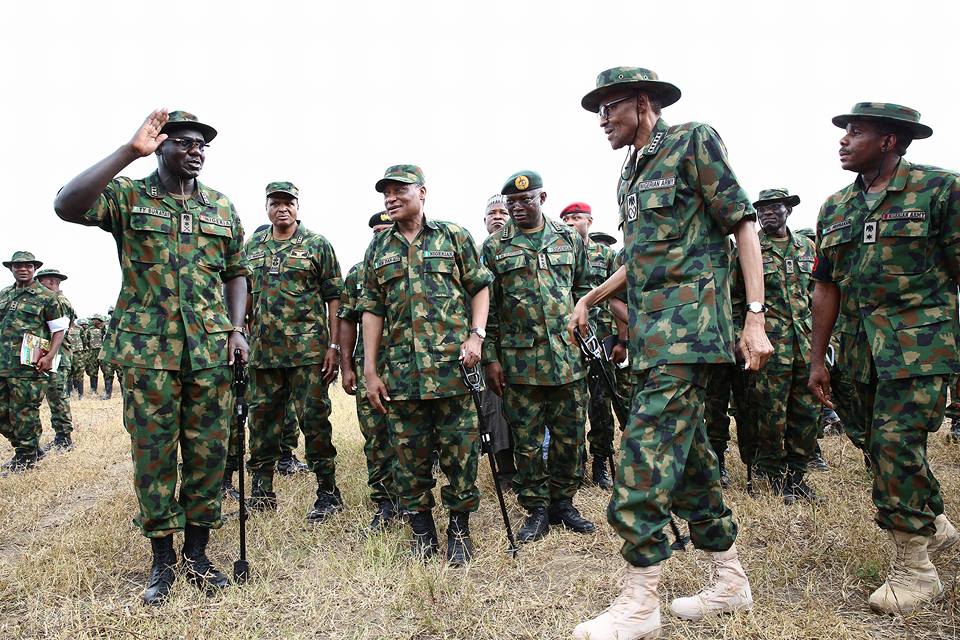President Muhammadu Buhari’s position on unleashing military forces on Niger Delta militants may not have changed 4 months after he stated the position.
Recall that in April, 2016 this during his visit to China, the president while meeting with the Nigerian community there said that saboteurs and vandals of the oil and gas installations in the Niger Delta region would be given the Boko Haram treatment should they continue with their nefarious acts.
“I ask for your support to make our vision of stamping out corruption a reality in the shortest possible time. Whoever is caught will not be spared. The government is still being dared, but those who are sensible should have learned a lesson. Those who are mad, let them continue in their madness,” Buhari said.
“I am aware that in the last two weeks, the national grid collapsed a number of times. I hope this message will reach the vandals and saboteurs who are blowing up pipelines and installations. We will deal with them the way we dealt with Boko Haram.”
On the night of Saturday, August 27, 2016 while holding bilateral talks with Japanese Prime Minister Shinzo Abe, on the sidelines of the sixth Tokyo International Conference on African Development (TICAD) in Nairobi, Kenya, the president made a repeat of the threat.
The development was a way of strongly assuring the existing and prospective foreign investors in Nigeria that their investments were fully secured and protected.
He told the Japanese leader that with the defeat of the Boko Haram terrorists by the military, the attention of the administration was now focused on stopping the destruction of the country’s economic assets by militants in the Niger Delta region. He said the militants must dialogue with the Federal government or be dealt with in the same way like Boko Haram.
“We are talking to some of their leaders. We will deal with them as we dealt with Boko Haram if they refuse to talk to us.
“As a government, we know our responsibility, which is to secure the environment. It is clear to us that lenders won’t fund projects in insecure environments.
“We realize that we have to secure the country before we can efficiently manage it,” the president said.
President Buhari also told Abe that security in the Gulf of Guinea, which he said was being greatly affected by piracy and armed robbery at sea, was a priority for the Nigerian government.
‘‘We have provided funds to our Navy to buy new platforms, train and effectively organize the personnel to protect the area. We are looking forward to support from developed nations for satellite surveillance covering the Gulf,’’ he said.
Recalling his audience with G7 leaders in Germany, which was attended by the prime minister, President Buhari thanked Japan for responding positively to the requests by Nigeria for the rehabilitation of victims of Boko Haram and rebuilding of infrastructure in the North Eastern part of the country.
The president however said there was still more to do on education, health and other infrastructure to ensure quick and voluntary return of displaced persons to their native communities.
On the United Nations Security Council reform, President Buhari agreed to work with Japan for the reforms, stressing that the case for a permanent seat for Africa on the Council was a moral one.
He equally expressed Nigeria’s support for Japan in their bid for a UN resolution on the problems in East China and South China as well as the “uncontrolled nuclear tests by North Korea.”
‘‘The UN system is sufficient for the resolutions of all disputes and no nation should be above the United Nations.
“This has to be made absolutely clear and I assure the Prime Minister that I will meet as many leaders as possible at the forthcoming UN General Assembly concerning the issues.”
In his remarks, Prime Minister Abe congratulated President Buhari “for courageously tackling Boko Haram terrorism.”
He said Nigeria and Japan must work together to improve the investment climate in view of the many Japanese companies wishing to invest in Nigeria. He reaffirmed Japan’s commitment to rapid development in Nigeria through quality delivery of ongoing projects in the country, including Jebba hydro power scheme and the Lagos railway project.







